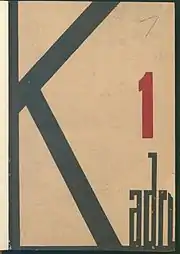Kadro
Kadro was an influential leftist magazine published in Turkey between 1932 and 1934.[1]
 | |
| First issue | January 1932 |
|---|---|
| Final issue | January 1935 |
| Country | Turkey |
| Based in | Ankara |
| Language | Turkish |
| Website | www |
Ideology
Kadro believed that a Turkish revolution would occur in two stages: the battle to achieve political sovereignty, achieved in the Turkish War of Independence, and an ongoing battle to "liberate" the economy and society from "imperialist" influence. To this end, the Kadro theorists borrowed heavily from Marxist theory, particularly elements of Soviet central planning, and also to a limited extent from south-west European fascism. Importantly, the Kadro theorists never accepted either of these ideologies, believing that they were creating a third (non-capitalist, non-socialist) development theory that would be essentially Turkish.
The theorists advocated absolute state control of the economy (statism Turkish: devletçilik, a key element of Kemalist ideology),[2] believing that Turkey could overcome the problem of class conflict if the state never developed a middle and upper class. If the state was in charge of development, class conflict would not arise, as capital would be in the hands of the state, not specific classes.
Kadro was important as it sought to provide Kemalist Turkey with a solid theoretical underpinning. Although Kadro policies were never absolutely adapted, Turkey did pursue a state-centered development strategy. The magazine Kadro led to the creation of a so called Kadro movement consistent of left-wing political theorists and its journalists took part in the nightly political debates organized by Atatürk.[3]
Although it claimed to be supportive of the government, the magazine was shut down in 1934:[3] economically liberal figures in the government (like Celal Bayar) worked against the Kadro theories, which they found far too leftist.
Kadro translates from Turkish as "cadre" (referring to the "cadre" of intellectuals who were to be the vanguard of the permanent Turkish revolution).
See also
- Şevket Süreyya Aydemir (theorist of Kadro)
- Kemalism
- Statism
References
- Çetin, Tamer; Oğuz, Fuat (2011-01-12). The Political Economy of Regulation in Turkey. Springer Science & Business Media. pp. 27–28. ISBN 978-1-4419-7750-2.
- Landau, Jacob M. (1984). Atatürk and the Modernization of Turkey. Boulder: Westview Press. p. 171. ISBN 0865319863.
- Weiker, Walter F. (1991). Heper, Metin; Landau, Jacob M. (eds.). Political Parties and Democracy in Turkey. I.B. Tauris. pp. 94–95. ISBN 1-85043300-3.
Further reading
- Harris, George. "The Communists and the Kadro: Shaping Ideology in Atatürk's Turkey". Istanbul: Isis, 2002.
- Turkes, Mustafa. "A Patriotic Leftist Development-Strategy Proposal in Turkey in the 1930s: The Case of the Kadro (Cadre) Movement", International Journal of Middle East Studies, 2001, 33: 91-114.